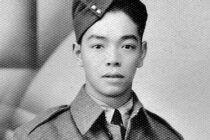
Daniel Wong, also known as Kwok Him Wong, was born in Vancouver in 1922, just days before Christmas (December 23). He was the eldest of seven children and attended the local public school, Lord Strathcona Elementary.
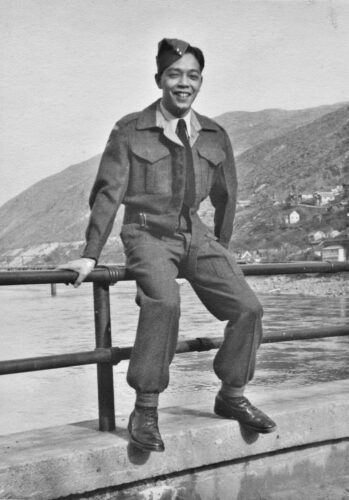
Like so many children of that generation, Daniel completed Grade 8, then left school to find work and help support his family. The country was in the midst of a horrible depression, and many families struggled just to put food on the table.
When the Second World War broke out in 1939, Daniel was only 17. Like so many other young Chinese men who were born and grew up in Canada, he wanted to get involved — to fight for the only country he had ever known.
Daniel would have listened to the heated debates taking place in Chinatown in the early years of the war. On one side were those community members who argued against any Chinese enlisting, given how poorly the community was treated by Canada. At the time, even Chinese born in Canada were denied citizenship and the right to vote.
On the other side of the debate were those who believed the war offered an opportunity for the Chinese to demonstrate their loyalty to Canada. The willingness to sacrifice their lives would make it easier for the community to demand citizenship after the war.
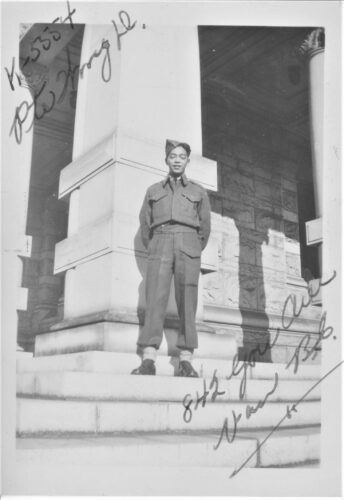
It is clear on what side of the debate Daniel sympathized. By 1944 or 1945 he enrolled in the Army and started basic training in Maple Creek Saskatchewan. He was assigned the service number K.5554.
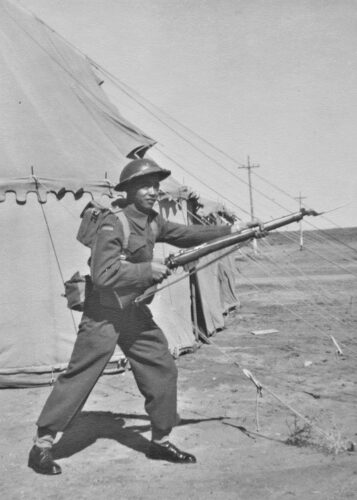
During training, Daniel was assigned to a small team that included Bing Chew Wong of Alert Bay and Dan Chan.
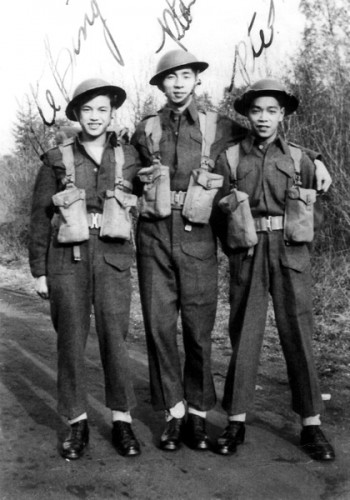
Daniel Wong (right) with good friend Bing Chew Wong (L) with Dan Chan. The three were originally being trained to be a team assigned to Force 136 operations. Circa 1945.
The three were initially slated to join other Chinese Canadian men who were assigned to Force 136 in southeast Asia. Their job would be to work clandestinely in Japanese-occupied territory, undertaking espionage and sabotage, while providing training and support to local guerrilla fighters.
To prepare for their missions, Daniel received training in wireless radio operations and learned Morse Code. His friend, Bing, became a skilled marksman and was trained in demolition and explosives. The third member of their group, Dan Chan, had a facility with languages and he was sent to a six-month Japanese language training course.
While Daniel and Bing awaited for their teammate to return, the war in Europe ended in May 1945.
With one enemy eliminated, the Allies now turned all their attention to bringing an end to the war in the Pacific. They started to plan an all-out assault on the home islands of Japan. They needed men to volunteer for what could be a suicide mission: the Japanese were expected to defend their homeland to the last man.
The invasion was planned for November 1945. And, despite their fears, Daniel and Bing decided to put their names forward: they became members of the Canadian Army Pacific Force, sometimes referred to as the Tiger Force.
In the end, neither Daniel nor Bing had to make that ocean crossing. In August of 1945, the U.S. detonated two atomic bombs over Japan, which led to the surrender of the island nation.
After the war, Daniel found work in restaurants and then as a cab driver. He married in 1957 and had three children.
Daniel who loved sports – all types of sports. And one of his favourite hangouts in Vancouver’s Chinatown was the famous B.C. Royal Café. His place was at the counter, often accompanied by his youngest child who was offered a free butterhorn my the cafe’s owner.
One night, while driving his taxi, Daniel has a serious accident. He switched jobs and become a day-time delivery truck driver. He delivered produce all around the Metro Vancouver area.
Sadly, Daniel was on the job delivering to an IGA store in Surrey when he suffered a massive heart attack. Daniel passed away on December 13, 1976.
Like his birth, it was days before Christmas when he left this world. Daniel was 10 days shy of his 54th birthday.
